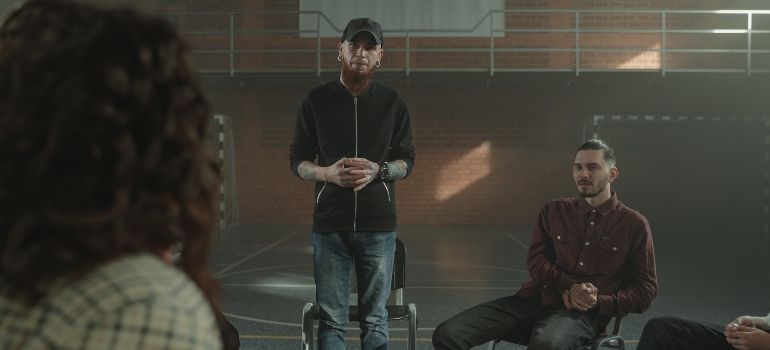Life happens. Sometimes, people stumble upon rocky paths, and one such challenging path is overcoming cocaine addiction. Unfortunately, many people are hesitant about seeking help because they fear it would upend their lives, making them step away from their jobs and family responsibilities. This is where outpatient cocaine rehab can be the answer. This less intrusive form of addiction treatment offers a lifeline to those seeking to reclaim their lives from the clutches of cocaine addiction without stepping away from their daily responsibilities. We’re here to demystify how outpatient cocaine rehab in WV works, casting light on a path that promises recovery while allowing you to stay anchored in your personal and professional lives.
What Is Outpatient Cocaine Rehab in WV?
Outpatient cocaine rehab in WV is a structured program designed to help individuals break free from cocaine addiction while they continue to live in their homes and maintain their daily routines. Unlike inpatient rehab, where you reside at a facility for the duration of your treatment, outpatient rehab allows you to receive addiction therapy and support without the need to take an extended leave from work, school, or family life. This flexibility is particularly appealing for those who have commitments they cannot or do not want to put on hold.

The most important part of outpatient rehab involves attending regular sessions—this could be counseling, group therapy for addiction, and educational workshops—scheduled around your other responsibilities.
These sessions focus on understanding addiction, learning coping strategies to deal with cravings and triggers, and building a supportive network to aid in recovery. The intensity and frequency of these sessions can vary, ranging from a few hours per week to several hours per day, depending on the program structure and your needs.
The key difference between outpatient and inpatient drug rehab in WV lies in the setting and the level of support they provide. Inpatient rehab offers a more immersive, round-the-clock care environment, which can be crucial for those with severe addictions or those who need a break from an environment that fuels their cocaine use. Outpatient rehab, on the other hand, requires a stable support system and a significant degree of self-motivation, as individuals must actively choose to engage with their treatment while continuing to face daily life, including potential exposure to triggers that led to their addiction.
Who Should Consider Outpatient Rehab?
Essentially, outpatient rehab is best suited for individuals who are in the early stages of addiction or those with mild to moderate dependency. This means if someone finds themselves starting to struggle with cocaine use but hasn’t reached a point where it completely controls their life, outpatient rehab could be the right choice. It’s particularly beneficial for those who have a stable living environment. This means living in a place that is supportive and free from temptations or pressures that might lead to cocaine use. If your home is a place where you feel motivated and supported in your recovery, it might work well for you.
Another crucial factor is having a strong support network. This includes family, friends, or even colleagues who understand what you’re going through and are there to offer encouragement, listen, and help keep you on track. If you have people who lift you up and push you toward your recovery goals, you’re in a good position to succeed.
Outpatient rehab is also ideal for those who cannot take an extended leave from their responsibilities, such as work, school, or caregiving duties. If you’re someone who needs to keep attending to your daily life, the flexible nature of outpatient programs can provide the structure and support you need without requiring a complete pause in your life.
What Does the Program Structure Look Like?
The structure of outpatient programs can vary, but they generally share a common framework. Typically, individuals attend sessions multiple times a week. However, the exact frequency can depend on the specific program and the individual’s needs. Some might find themselves attending therapy or group meetings every day, while others might only need to go two or three times a week.

The types of activities and therapies involved in outpatient programs are diverse and aimed at addressing both the psychological and behavioral aspects of addiction. This includes one-on-one counseling, group therapy, and educational workshops that teach about addiction, coping strategies, and how to rebuild one’s life after cocaine use.
Duration-wise, outpatient programs can last anywhere from a few months to over a year, depending on the program’s design and the individual’s progress. The goal is to provide enough time for the person to develop coping mechanisms, gain insights into their addiction, and build a solid foundation for a cocaine-free life. Throughout the program, the frequency of sessions may decrease as the individual gains more tools and confidence to manage their recovery independently.
What Types of Therapies and Treatments Are Offered?
Outpatient rehab uses a variety of therapies and addiction treatments to help you tackle your addiction from multiple angles. These can include:
- Cognitive Behavioral Therapy (CBT): This therapy teaches coping skills to deal with cravings and avoid situations that might lead to drug use. Essentially, cognitive behavioral therapy for substance use disorders helps rewire how you think and react to stress or triggers.
- Motivational Interviewing (MI): Motivational interviewing for substance abuse is a counseling approach that helps increase a person’s motivation to change. It’s a supportive therapy that encourages individuals to talk about their desire to change their behavior and make their own arguments for recovery.
- Group Therapy: In group sessions, individuals share their experiences and challenges with peers who are also navigating recovery. This promotes a sense of community and understanding.
- Family Therapy: Addiction doesn’t occur in a vacuum—it affects family dynamics and relationships. Family therapy for addiction involves loved ones in the recovery process, helping to repair and strengthen these bonds.
- Relapse Prevention Training: This aspect of treatment focuses on identifying triggers that might lead to cocaine use and developing strategies to cope with these triggers. It’s about planning for the future.
How Do Outpatient Programs Support Recovery?
Outpatient programs are designed with structures that ensure both support and accountability, crucial elements for a successful recovery journey. An essential component of this structure is regular drug testing, which serves as a straightforward, albeit sensitive, method for maintaining accountability. It’s not just about checking if someone has relapsed but also about celebrating their continuous progress and sobriety.

Also, support groups within these programs act as a backbone for emotional and moral support. Imagine a space where sharing experiences, challenges, and victories isn’t just encouraged but forms the basis of mutual understanding and encouragement. These groups provide a sense of belonging and community, reminding individuals that they are not alone in their struggles and successes.
Furthermore, outpatient programs are proactive about the reality of potential relapses. They equip individuals with strategies and plans to address and manage these situations, should they arise. This might include identifying early warning signs of a relapse, having a clear action plan for seeking help, and strengthening coping mechanisms to navigate through such challenges.
What Are the Benefits of Outpatient Cocaine Rehab in WV?
Outpatient drug rehab in WV offers several benefits that make it a compelling choice for many individuals seeking to overcome their addiction. These advantages include:
- Flexibility and Convenience: One of the most significant benefits is the flexibility outpatient programs offer. You can continue with work, education, or family responsibilities while receiving treatment.
- Access to Support Systems: Outpatient rehab allows you to stay in close contact with your support network of family and friends. This ongoing support can be crucial for recovery.
- Real-World Application: Since outpatient treatment occurs alongside an individual’s daily life, it offers immediate opportunities to apply the coping strategies and techniques learned in therapy to real-world situations.
- Cost-Effectiveness: Generally, outpatient programs are less expensive than inpatient rehab because they do not include the costs of lodging and round-the-clock care. This makes outpatient rehab a more accessible option.
- Privacy and Anonymity: For those concerned about privacy, outpatient rehab can offer a more discreet option. Participants can maintain their usual routine, reducing the need to explain a prolonged absence to employers or acquaintances.
What Challenges Might Participants Face During Outpatient Cocaine Rehab in WV?
Recovery through an outpatient program can come with its own set of challenges, yet these programs are thoughtfully designed to navigate through such hurdles. One common challenge is the temptation to fall back into old habits, especially when daily routines bring individuals face-to-face with past triggers and environments associated with cocaine use. To address this, outpatient programs offer continuous counseling and support groups that provide a safe space to discuss these temptations openly and receive encouragement and advice from those who understand.

Another challenge can be the feeling of isolation or misunderstanding from friends or family who might not fully grasp the complexities of addiction. Here, family therapy sessions become invaluable, fostering understanding and rebuilding connections, making loved ones integral to the recovery process.
Additionally, the fear of relapse looms large, but outpatient programs counter this fear by equipping individuals with relapse prevention strategies and making sure they know that a slip-up doesn’t mean failure but rather a step in the learning and healing process.
How to Choose the Right Outpatient Rehab Program in West Virginia
When choosing the right outpatient rehab program in WV, it’s crucial to consider several factors to ensure it meets your specific needs and provides effective treatment.
Check first and foremost to see if the program has received accreditation from reputable organizations, as this guarantees that it adheres to certain quality and safety standards. Next, look into the qualifications and experience of the staff members, including therapists, counselors, and medical professionals. Their expertise plays a significant role in guiding you through your recovery journey.
Additionally, consider the types of therapies offered by the program and whether they align with your preferences and treatment goals. From cognitive-behavioral therapy to group counseling, a variety of approaches can contribute to your recovery.
Lastly, don’t forget to check your insurance coverage to see if the program is within your financial means. Harmony Ridge Recovery Center excels in all these aspects.
If you’re looking for rehabs in WV that accept Medicaid and most other insurance providers while offering accredited programs led by experienced staff, we are the right choice for you.
What Happens After Completing an Outpatient Program?
After completing an outpatient program, individuals transition back into their daily lives armed with the tools and skills they’ve acquired during treatment. This period is often referred to as “aftercare treatment” or “continuing care,” and it’s a critical phase of the recovery journey.
During this time, individuals may continue to attend support groups, therapy sessions, or follow-up appointments to maintain their sobriety and address any ongoing challenges. They might also engage in activities that promote wellness and resilience, such as exercise, meditation, or hobbies that bring joy and fulfillment.

Additionally, staying connected with their support network—whether it’s family, friends, or fellow peers in recovery—remains essential for ongoing encouragement and accountability. Overall, the focus shifts from intensive treatment to sustaining the progress made and navigating the ups and downs of life without turning to drugs or alcohol.
Contact Outpatient Cocaine Rehab in WV
Outpatient cocaine rehab in WV offers a flexible and accessible path to recovery for individuals seeking to overcome addiction while maintaining their daily responsibilities. Through a combination of therapy, support groups, and practical coping strategies, outpatient programs provide the tools and support necessary for individuals to reclaim their lives from the grip of addiction. By empowering you to address your addiction within the context of your everyday life, outpatient rehab offers a holistic approach to healing that fosters long-term success and resilience. Reach out to Harmony Ridge and find out how we can support you.



